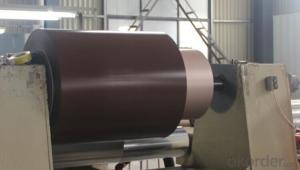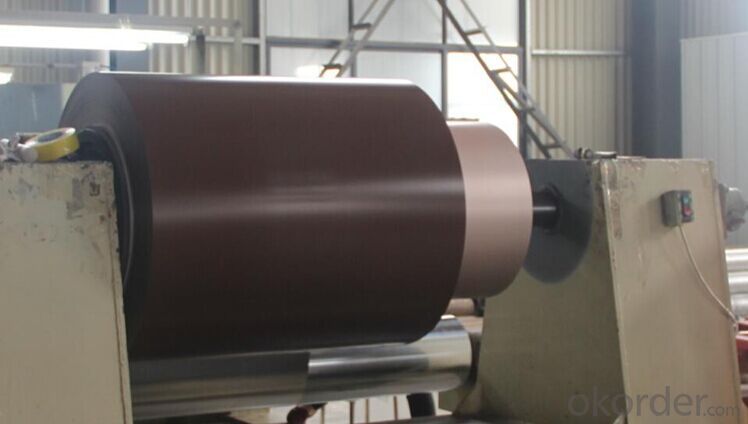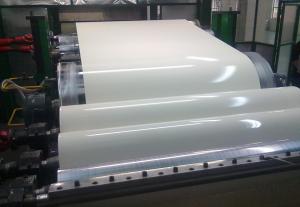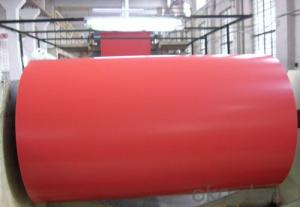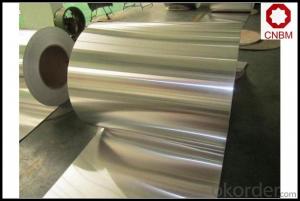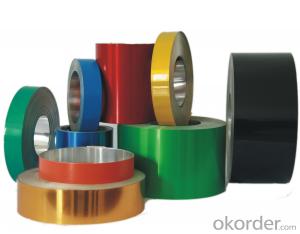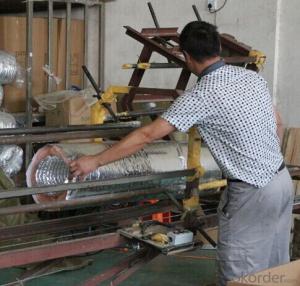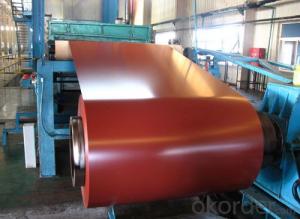York Aluminum Coil - Larger Image Color Coated Aluminum Sheet Coil for Roofing and Cladding System
- Loading Port:
- China main port
- Payment Terms:
- TT OR LC
- Min Order Qty:
- 10 m.t
- Supply Capability:
- 1000 m.t/month
OKorder Service Pledge
OKorder Financial Service
You Might Also Like
Specification
The Specification of Coated Aluminium Coil:
Application:The aluminium coil can be used to ACP,wall cladding, facades, roofs and canopies, ceilings, signboards, blind window, display platforms, electrical panels , etc
| Alloy | 1050 1060 1100 3003 3004 3005 5005 8011 etc |
| Temper | H12,H14,H16,H18,H24,H26 |
| Thickness | 0.02mm - 1.2mm |
| Width | Standard width: 1240mm |
| Special width: 1300mm,1520mm,1570mm,1595mm | |
| Diameter | Standard dia:1200mm |
| Interior dia:150mm,405mm,505mm | |
| Weight | 2.5 T/coils, 3.0 T/coil |
| Coating | PE, PVDF,ACRYLIC |
| Surface | Embossed, mill finish, coated |
| Color | As to code RAL |
| Gloss | 10-90% (EN ISO-2813:1994) |
| Coating Thickness | PE:more than 18 micron |
| PVDF: more than 25 micron | |
Coating Hardness (pencil resistance) | More than 2h |
| Coating Adhesion | 5J(en iso-2409:1994) |
| Impact Resistance | No peeling or cracking(50 kg/cm,ASTMD-2794:1993) |
PVDF Coated:
Coated Aluminum Coil features with super durability and weather resistance,and better properties to anti-acid,anti-alkali,keeping more than 15 years without fading in using as external wall cladding.
The Main Features of Aluminium Coated Coil:
1.High temperature resistant
2.Weathering resistance
3.Scrubbing resistant
4.Sound insulation
The Images of Aluminium Coated Coil:

FAQ:
Q: Can you provide free samples?
A: Yes, free samples will be sent to you on freight at destination.
Q: Can I get your latest catalogue?
A: Yes, it will be sent to you in no time.
Q: What is the MOQ?
A: 5 tons
Q: What are your payment terms?
A: We accept L/C,T/T, West Union,etc.
- Q: Is it possible to use a magnet to determine if an aluminum coil has magnetic properties?
- <p>No, you cannot use a magnet to test the magnetic properties of an aluminum coil. Aluminum is a non-magnetic material, meaning it does not have magnetic properties and will not be attracted to a magnet. Magnets are used to test ferromagnetic materials like iron, nickel, and cobalt. To test for magnetic properties, you would need to use a different method, such as an electromagnetic induction test, which can detect magnetic fields generated by electrical currents in a coil.</p>
- Q: How do aluminum coils compare to other types of metal coils?
- Aluminum coils are lighter in weight compared to other types of metal coils, making them easier to handle and install. They also have excellent corrosion resistance, ensuring durability and longevity. Additionally, aluminum coils have good thermal conductivity, allowing for efficient heat transfer. However, they may have lower tensile strength compared to certain other metal coils. Overall, aluminum coils offer several advantages and are commonly used in various industries including HVAC and automotive.
- Q: What is the typical coil width for aluminum coils?
- The typical coil width for aluminum coils can vary, but it is commonly found in the range of 12 inches to 60 inches.
- Q: Consider the following ionization energies for aluminum:Al(g) → Al+(g) + eI1 = 580 kJ/molAl+(g) → Al2+(g) + eI2 = 1815 kJ/molAl2+(g) → Al3+(g) + eI3 = 2740 kJ/molAl3+(g) → Al4+(g) + eI4 = 11,600 kJ/mol A) Account for the trend in the values of the ionization energies.B) Explain the large increase between I3 and I4.
- Iron is the main properly-known steel interior the earth. Carbon ought to have the utmost first ionization skill. it rather is considering is going to be the main resultant to resign / take one greater electron. Bromine is so on the brink of being a noble gas it is going to effortlessly income an electron to try this, for that reason it could have a low first ionization skill. the backside electronegative is interior the decrease left nook of the periodic table. It is going to the utmost as much as the better precise of the periodic table. for that reason l. a. could have the backside electronegative.
- Q: Describe the various uses of aluminum coils in the manufacturing industry.
- <p>Aluminum coils are widely used in manufacturing due to their lightweight, corrosion resistance, and strength. They are utilized in the production of various products such as automotive parts, aerospace components, and construction materials. Aluminum coils are also employed in the manufacturing of electrical wiring, heat exchangers, and packaging materials. Additionally, they are used in the production of cans and foils for food and beverage industries. Their versatility makes aluminum coils an essential material in many manufacturing processes.</p>
- Q: How do aluminum coils contribute to the insulation properties of products?
- The insulation properties of various products are greatly enhanced by aluminum coils, playing a crucial role. The utilization of aluminum coils in insulation systems leads to improved thermal efficiency, decreased heat transfer, and reduced energy consumption. To begin with, aluminum possesses excellent heat and electricity conducting abilities. This particular characteristic enables aluminum coils to distribute and dissipate heat effectively, preventing the transfer of thermal energy from one side of the product to the other. Consequently, aluminum coils act as a barrier, minimizing the loss or gain of heat, which is essential for maintaining optimal temperatures across different applications. Additionally, aluminum coils exhibit low thermal conductivity. This implies that they are not easily affected by temperature changes and do not efficiently transfer heat. As a result, products incorporating aluminum coils can better withstand external temperature fluctuations, providing superior insulation against hot or cold conditions. Moreover, aluminum coils are lightweight, allowing for easy handling and installation in various products. This lightweight attribute is advantageous as it does not impose significant weight on the overall structure, making it suitable for industries requiring portable or lightweight insulation solutions. Furthermore, aluminum possesses high resistance to corrosion, making it ideal for applications in humid or corrosive environments. This durability ensures that the insulation properties of products containing aluminum coils remain effective over an extended period, without deterioration or compromise in performance. Additionally, aluminum is a recyclable material, aligning with sustainable practices. The use of aluminum coils in insulation products promotes environmental consciousness by reducing waste and energy consumption associated with the manufacturing of new materials. In conclusion, aluminum coils contribute significantly to the insulation properties of products by effectively distributing and dissipating heat, minimizing heat transfer, and resisting temperature fluctuations. Their lightweight nature, durability, and recyclability further augment their effectiveness as an insulation component. Overall, aluminum coils represent a valuable addition to insulation systems, enhancing thermal efficiency and decreasing energy consumption.
- Q: Can aluminum coils be used in solar panel applications?
- Yes, aluminum coils can be used in solar panel applications. Aluminum is a lightweight and durable material that is commonly used in various industries, including the solar panel industry. Aluminum coils are often used as the base material for solar panels due to their corrosion resistance, high thermal conductivity, and excellent electrical conductivity. These properties make aluminum coils suitable for effectively transferring heat and electricity within the solar panels, ensuring optimal performance and efficiency. Furthermore, aluminum is also a highly sustainable material as it can be easily recycled, making it an environmentally friendly choice for solar panel applications.
- Q: Can aluminum coils be used in the production of solar panels?
- Aluminum coils are indeed suitable for the production of solar panels. Being a lightweight and durable material, aluminum brings numerous advantages to the manufacturing process. Its high conductivity and exceptional thermal properties enable efficient dissipation of heat. Furthermore, aluminum exhibits resistance to corrosion, a vital characteristic for solar panels as they encounter diverse weather conditions. Moreover, the cost-effectiveness of aluminum makes it a favored option in the solar industry. By employing aluminum coils in solar panel production, the performance, durability, and cost-effectiveness of these panels are greatly improved.
- Q: 1) From What does aluminium derive its name?2)From which ore is aluminium extracted?3)Which country produces more aluminium than any other?4)An American and French scientist both patented the current process used to produce aluminium, what were there names?5)Who is credited with having been first to produce metallic aluminium?
- 1) From What does aluminium derive its name? Ancient Greeks and Romans used aluminium salts as dyeing mordants and as astringents for dressing wounds; alum is still used as a styptic. In 1761 Guyton de Morveau suggested calling the base alum alumine. In 1808, Humphry Davy identified the existence of a metal base of alum, which he at first termed alumium and later aluminum . The earliest citation given in the Oxford English Dictionary for any word used as a name for this element is alumium, which British chemist and inventor Humphry Davy employed in 1808 for the metal he was trying to isolate electrolytically from the mineral alumina. 2)From which ore is aluminium extracted? Bauxite 3)Which country produces more aluminium than any other? China 4)An American and French scientist both patented the current process used to produce aluminium, what were there names? Hall and Héroult 5)Who is credited with having been first to produce metallic aluminium? Friedrich W?hler
- Q: Are aluminum coils suitable for heat exchanger fins?
- Yes, aluminum coils are suitable for heat exchanger fins. Aluminum is a lightweight and highly conductive material, making it an excellent choice for heat transfer applications. The high thermal conductivity of aluminum allows for efficient heat exchange between the fins and the surrounding air or fluid. Additionally, aluminum has good corrosion resistance properties, which is important for heat exchangers that are exposed to moisture or harsh environments. The use of aluminum coils in heat exchanger fins also offers advantages such as high strength, durability, and ease of fabrication. Overall, aluminum coils are a popular and effective choice for heat exchanger fins due to their excellent thermal conductivity, corrosion resistance, and other beneficial properties.
Send your message to us
York Aluminum Coil - Larger Image Color Coated Aluminum Sheet Coil for Roofing and Cladding System
- Loading Port:
- China main port
- Payment Terms:
- TT OR LC
- Min Order Qty:
- 10 m.t
- Supply Capability:
- 1000 m.t/month
OKorder Service Pledge
OKorder Financial Service
Similar products
Hot products
Hot Searches
Related keywords
